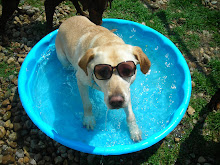We all want to share a safe and happy holiday season with our pets. There are a few steps that you want to follow to make sure that you and your pet have a safe, happy and healthy holiday season.
In this article I am going to discuss which plants, foods, and decorations to be careful around with your pet.
Step 1: Food related items. Your dog could get into some serious trouble with many of the holiday foods around at this time of year. Be aware of these food items and be sure to keep them well out of reach:
Coffee, tea and chocolate - Chocolate, coffee, and tea all contain a harmful substance called xanthine, which causes nervous system and/or urinary system damage and heart muscle stimulation.
Chocolate, especially unsweetened baking chocolate and dark chocolate, contains a substance called theobromine that is dangerous for your dog.
Bones from cooked fish, meat, or poultry can be dangerous if swallowed. Even small cooked bones can splinter causing tearing in your dog’s intestinal tract. Be sure to keep cooked bones away from your dog.
Uncooked bread dough can expand in your dog’s stomach producing gas in her digestive system, causing pain and possible rupture of her stomach or intestines.
Meat juices on plastic or aluminum foil left out can be very tempting to your dog. If he eats the plastic or foil wrap, it can cause choking or an obstruction in his intestines. If ingested, meat-soaked strings from roasts can cause a surgical emergency called a “linear string foreign body” in the intestines.
Step 2: Poisonous Plants - Plants can make your home more festive for the holidays with their green leaves and bright red flowers. It’s important though to be aware that many of the plants in your home during the holidays can be poisonous to your dog.
If ingested, holly (leaves and berries) causes stomach upset and can be potentially fatal to both dogs and cats.
Hibiscus may cause diarrhea.
Poinsettias have an irritating sap that can cause blistering in the mouth and stomach upset.
Step 3: Decorations and Wrappings - Be very careful with candles.
Candles on end tables are well within reach of your dog’s tail and can get knocked over in all the excitement and burn your dog or start a fire. Never leave lit candles unattended or within reach of your pet.
Potpourri contains oils that can be toxic to your dog if eaten.
Snow globes often contain antifreeze, which is poisonous to dogs.
Ribbons, yarn, and string can cause an intestinal obstruction in your dog and bunching of the intestine along the length of the string. These conditions require surgery and can be fatal.
Adhesives and glues can be toxic and are often attractive to dogs.
Step 4: Gifts Under The Tree - Batteries for toys or other gifts can be toxic and cause intestinal obstruction. Be sure to keep them in a safe place until you are ready to use them.
Rawhide Chews or other edible items wrapped as presents and left under the tree can be very tempting to your dog. Many companies often wrap rawhide chews and other pet gifts in ribbon. Make sure to remove ribbons or ties before you give these gifts to your dog.
Perfumes and after-shaves contain ethanol (alcohol) and perfumes also contain essential oils which can be very toxic to dogs if swallowed.
Step 5: Christmas Trees - Be sure to place your Christmas tree in a sturdy stand, and if you have a very active dog that might knock it over, a good idea is to attach the tree securely to a window or wall with something like fish line.
Tinsel can cause blockages in your dog’s stomach and intestine, which often require surgery to remove. If you have a young dog that likes to get into things, it may be best to leave it off the tree altogether.
Angel hair, flocking, and artificial snow are mildly toxic to your dog and if eaten in larger amounts can also cause a blockage in the intestine.
Chewing on electrical cords, including cords of Christmas tree lights can cause problems for your dog ranging from burned mouths, to electrical shock, to death by electrocution.
Step 6: Tips To Reduce Stress For Your Pet During The Holidays - Reduce stress by keeping your dog’s feeding and exercise routine on a consistent schedule.
Extra holiday activity and travel may be stressful to your dog, making him extra thirsty. Dogs typically pant more when they feel stressed. Keep fresh water available for him to drink.
Holiday guests and other activity can be very stressful and even frightening to many dogs. They can also trigger illness and intestinal upset.
Make sure your dog has a safe place to retreat in your house like his crate.
Also make sure your dog has on his I.D. tags in case he darts out the door when guests come and go.
Tips & Warnings
If you suspect that your dog has eaten something toxic, call yourveterinarian and/or the ASPCA Animal Poison Control Center's 24-houremergency hotline at 1-888-4-ANI-HELP.When you decorate your home for the holidays, place these plants wellout of your dog's reach, or use imitation plants.Feed your dog before a party so she will he will not be as likely to beg or steal food.
By Eric Letendre
eHow Contributing Writer
15 years ago








Thanks for posting such great info about pet safety during the holidays! Don't forget about those very poisonous Easter lilies (which are the #1 flower used by florists in bouquets), and liquid potpourri (which causes severe burns in cat's mouths!).
ReplyDeleteKeep in mind people can also call Pet Poison Helpline, another 24/7 animal poison control based out of Minneapolis. We're more cost-effective ($35/case vs ASPCA's $60). You can find more information at www.petpoisonhelpline.com or calling 1-800-213-6680 in the event of an emergency!